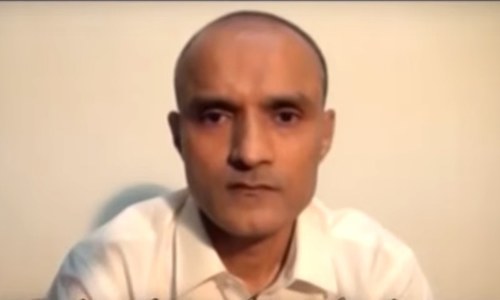FO chides India for doubting own lawyer in spy’s case

ISLAMABAD: Pakistan has rejected as ‘incorrect’ and ‘misleading’ the assertions made by the Indian Ministry of External Affairs (MEA) regarding the legal proceedings currently taking place in the case of Indian naval commander Kulbhushan Sudhir Jadhav.
“It is evident that by casting aspersions on the Indian High Commission’s own legal counsel, the Indian government is looking for an escape from the legal proceedings in Commander Jadhav case,” noted the Foreign Office spokesman in a statement issued here on Friday.
He reminded the government of India that in pursuance of the judgement of the International Court of Justice (ICJ), Pakistan had invited the Indian High Commission to meet Commander Jadhav and appoint a lawyer on his behalf so that proceedings to review and reconsider Commander Jadhav’s conviction could commence. However, during the course of diplomatic exchanges, the Indian High Commission refused to instruct a lawyer itself, as in their view this would amount to a waiver of India’s sovereign immunity. Resultantly, the government of Pakistan was constrained to initiate proceedings for appointment of a state counsel for Commander Jadhav.
Engaging counsel for Ismail but not for Jadhav shows ‘discrepancy’ in Delhi’s stance, says attorney general
To show the discrepancy in the Indian position, the Attorney General for Pakistan during the course of the proceedings cited the case of Mohammad Ismail, an Indian national currently in custody in Pakistan, where the Indian High Commission had engaged Shahnawaz Noon as its lawyer.
Contrary to the false statement by the Indian MEA, no attempt was made to link the cases of Commander Jadhav with another Indian prisoner Ismail, the FO said. “The two cases are and remain entirely distinct. Reference to Mr Ismail’s case was only for purpose of showing the ‘discrepancy’ and ‘inconsistency’ in the Indian position,” the FO statement explained.
In line with the International Court of Justice (ICJ) judgement, Pakistan has already provided consular access to the Indian High Commission twice and has taken all necessary steps for effective review and reconsideration in the case, it said.
“The offer of a third consular access is still there. The Indian side is once again urged to desist from the use of its usual diversionary and dilatory tactics and instead take practical steps so that legal proceedings could be duly concluded and full effect could be given to the judgement of ICJ,” the FO said.
The FO statement came a day after India blamed Pakistan for linking Kulbhushan Jadhav case with another prisoner’s case.
Earlier at a weekly media briefing on Thursday, spokesman for the Indian Ministry of External Affairs claimed that in “routine consular practice”, Shahnawaz Noon was “selected” by the Indian High Commission in Islamabad to appear in the case pertaining to release and repatriation of the Indian prisoner, Mohammad Ismail, who has completed his sentence but continues to be in jail.
“However, during the proceedings of the case regarding Ismail, Pakistan Attorney General raised the matter pertaining to Jadhav though the two cases are not connected in any way, and Noon is reported to have made those statements about our Charge d’Affaires which are not true, and they are in contravention of our stand in this case,” the spokesman added.
He further claimed that Barrister Noon did this “under pressure” and “misrepresented” the position of the Indian High Commission.
Published in Dawn, December 5th, 2020













































